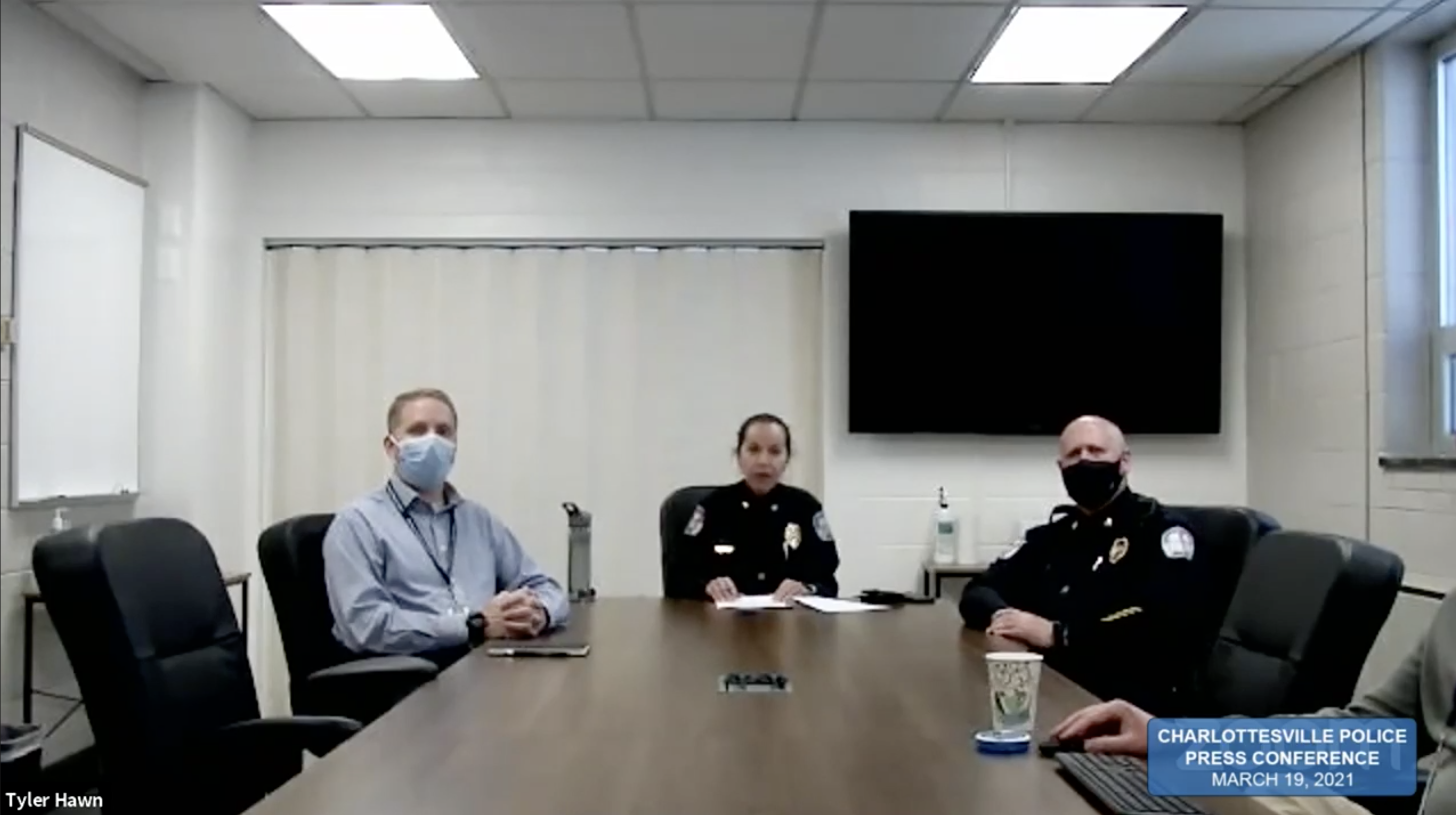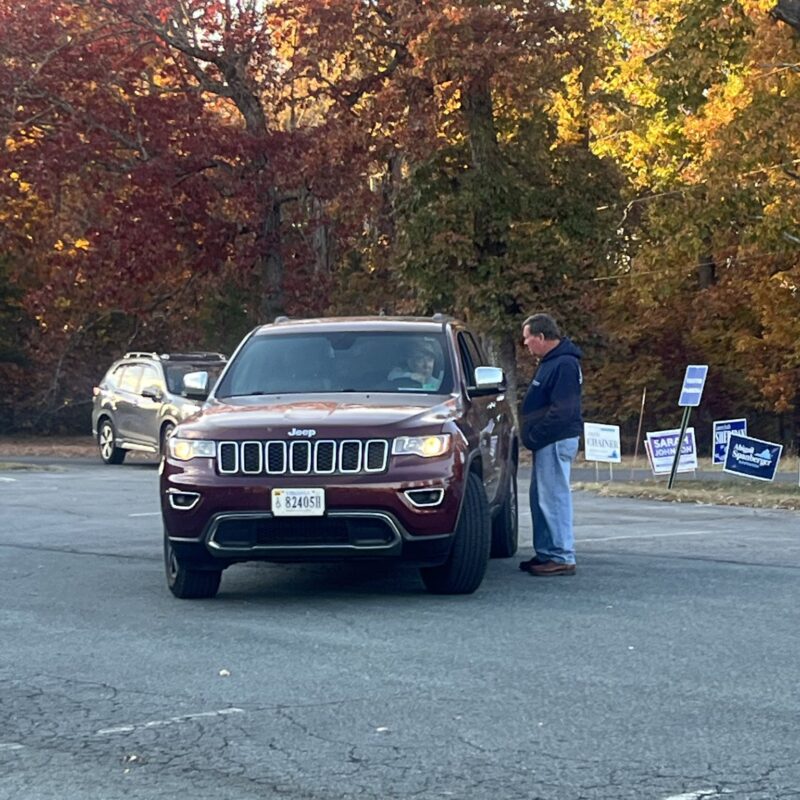Two white Charlottesville police officers who injured two Black civilians in separate incidents are no longer employed by the department, announced Chief RaShall Brackney at a virtual press conference on Friday.
One officer, Jeffrey Jaeger, was convicted of assault in December. The other, Joseph Wood, was determined to have breached the department’s internal standards when he detained a local musician during a January roadside encounter.
After conducting an internal investigation, the department concluded that Wood violated its policies when he tackled LaQuinn Gilmore to the ground, leaving Gilmore with several injuries. However, the unlawful detainment was not motivated by racial bias, according to the department’s investigation. Gilmore’s lawyer believes CPD did not do a thorough enough investigation to reach that conclusion, however.
While driving down Monticello Avenue on January 11, Gilmore, who is Black, began to feel sick from the antibiotics prescribed to him for a hand infection, so he pulled over.
Body camera footage publicly released by the department shows that Wood parked behind Gilmore, got out of his car, and asked him if he was okay. Gilmore assured Wood that he was fine, and held his phone up to record the encounter. Wood began to walk away, but turned around when Gilmore complained that cops “be playing too much.” He then asked Gilmore for his driver’s license.
Wood “failed to articulate or justify his reasoning to reengage, and reacted solely on being challenged,” explained Brackney.
The footage shows that Gilmore refused to give Wood his license, claiming multiple times that he did nothing wrong. Gilmore soon crossed to the other side of the street and told Wood to stop “harassing” him, but Wood followed him, continued to ask for his license, and called for back-up.
About two minutes later, Wood suddenly slammed Gilmore to the ground. Another officer helped Wood roughly pin down and handcuff Gilmore, ignoring the splint on his injured hand. After sitting Gilmore up, Wood performed a pat down, though he had no legal reason to suspect Gilmore was armed.
As around half a dozen officers stood by, Wood handcuffed Gilmore again when he refused to stop recording the incident, and forced him to stand against the back of his car. The supervisor on duty eventually arrived on the scene, and claimed that Wood had probable cause to follow Gilmore because he could have been driving drunk.
“[Wood] body slammed me on my face for nothing!” Gilmore exclaimed. “My spine is in pieces.”
Once Gilmore gave the officers his social security number, they discovered his license was suspended. He was not charged with a crime, and was allowed to have a friend drive him home.
Though the department ruled that Wood did not use excessive force during the encounter, hospital records show that Gilmore suffered a closed head injury, a concussion, contusions on his legs, acute bilateral lower back pain, and acute post-traumatic headaches.
Brackney would not confirm during the press conference if Wood injured Gilmore. “We don’t substantiate medical claims,” said the chief.
Any force used when affecting an unlawful detention is itself excessive.
Jeffrey Fogel, local attorney
Because Wood initiated the encounter to check on Gilmore, Brackney also claimed that he did not racially profile him.
“There were no racial slurs, ethnic status, or characteristics that were based solely on [Gilmore’s] race for the detention,” she said.
The internal investigation did not sustain Gilmore’s claims that Wood drew his gun during the encounter, or that officers on the scene damaged his cell phone and tail light. However, body camera footage showed that Gilmore’s phone fell on the ground when Wood tackled him.
Gilmore’s lawyer, local criminal justice attorney Jeffrey Fogel, was not satisfied with the department’s findings.
In order to properly assess whether bias was at play during the interaction, “one would need to look at Officer Wood’s history with the department and any other evidence that may touch on his treatment of Black people,” wrote Fogel in an open letter to the CPD. “You did no investigation of this question and offer no reason why Officer Wood acted the way he did.”
In addition, Fogel disputes the finding that Wood unlawfully detained Gilmore but didn’t use excessive force. “Any force used when affecting an unlawful detention is itself excessive,” he wrote.
During the press conference, Brackney also addressed the case of Jeffrey Jaeger, the other officer who was removed from duty. Last December, Jaeger was convicted of misdemeanor assault and battery for slamming Andre Henderson into a wooden fence during a March 3 arrest.
“Wood and Jaeger’s actions highlight the injustices that permeate the fabric of our society and of a criminal legal system that is rooted in supremacy and anti-Black violence,” said Brackney. “Their actions erode the community’s confidence, and elevate fears that Black and Brown communities…will be brutalized, overpoliced, and underprotected.”
“They have harmed this community, and for their actions I am sorry,” Brackney concluded.






